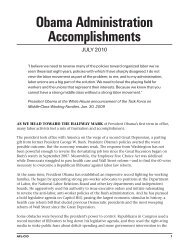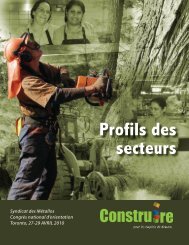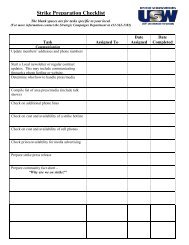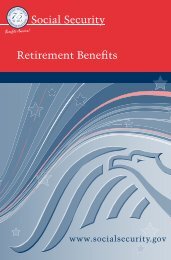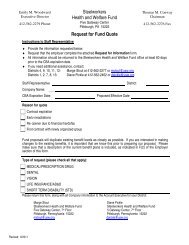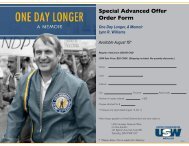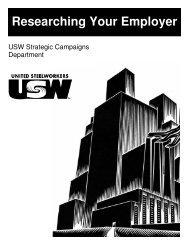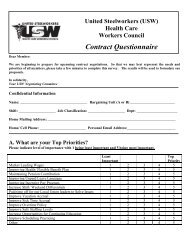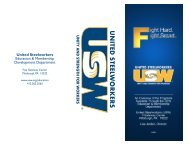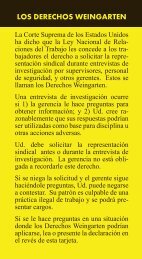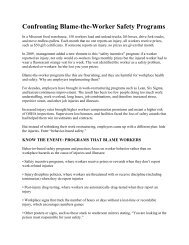Union Approach to Health and Safety: - United Steelworkers
Union Approach to Health and Safety: - United Steelworkers
Union Approach to Health and Safety: - United Steelworkers
You also want an ePaper? Increase the reach of your titles
YUMPU automatically turns print PDFs into web optimized ePapers that Google loves.
908 DECISIONS OF THE NATIONAL LABOR RELATIONS BOARD<br />
<strong>Union</strong>’s back <strong>to</strong> create Company-dominated ‘PEP’ teams <strong>to</strong><br />
address health <strong>and</strong> safety issues.’’<br />
g. Company motivation<br />
As an explanation for staffing the safety <strong>and</strong> fitness committees<br />
with employee volunteers—not following the ‘‘most<br />
common’’ practice of having ‘‘Joint labor-management committees’’—the<br />
Company contends in its brief (at 139 fn. 23)<br />
that the answer is ‘‘Quite simple.’’ It contends that such volunteers<br />
‘‘would be highly motivated <strong>and</strong> individually committed<br />
<strong>to</strong> bring their individual interests <strong>and</strong> talents <strong>to</strong> bear<br />
on committee matters.’’<br />
I note, however, that the Company’s own records reflect<br />
another explanation—an antiunion motivation.<br />
An interoffice management memor<strong>and</strong>um dated September<br />
26, 1989 (G.C. Exh. 41 at 71), regarded ‘‘Support for Employee<br />
Recreational Events—1990’’ in the Fitness Committee<br />
budget. Management Assistant Gerald Ferguson, with<br />
a copy <strong>to</strong> the unit manager, stated in the memor<strong>and</strong>um:<br />
I think we should budget some funds in 1990 for the<br />
support of employee activities, e.g. softball. ...<br />
If we don’t have some type of limited funding system,<br />
the alternative is <strong>to</strong> perpetuate the current practice<br />
where some organizations aggressively sponsor their<br />
employee teams (J[ackson]L[ab]) <strong>and</strong> others take a hard<br />
line. It seems that this practice just drives employees <strong>to</strong><br />
the <strong>Union</strong> for assistance—I would like <strong>to</strong> change that.<br />
How’s $10000 sound? [Emphasis added.]<br />
Thus, the Company was considering a Fitness Committee<br />
recreation budget of $10,000 for an antiunion purpose of<br />
competing with the <strong>Union</strong>.<br />
2. Affirmative defenses<br />
a. ‘‘Jefferson Chemical’’ defense<br />
The Company contends in its brief (at 121):<br />
Under principles set forth in Jefferson Chemical Co.,<br />
200 NLRB 992 (1972), the General Counsel was<br />
dutybound <strong>to</strong> investigate <strong>and</strong> <strong>to</strong> litigate all matters encompassed<br />
by the broad charge alleging violations of<br />
Section 8(a)(2) <strong>and</strong> 8(a)(5) in [the earlier Design Team<br />
case] which was tried in May 1989. His failure <strong>to</strong> do<br />
so requires that any matters which were known, or<br />
should have been known, by the General Counsel in<br />
May 1989 be dismissed.<br />
The Company points out (at 122–123) that the amended<br />
charge in the earlier case alleged that the Company ‘‘formed,<br />
dominated <strong>and</strong> assisted employee organizations,’’ that ‘‘by<br />
forming, assisting <strong>and</strong> dominating this organization’’ it violated<br />
Section 8(a)(2), <strong>and</strong> that ‘‘in dealing with other entities’’<br />
it violated Section 8(a)(5). (Emphasis added.) The<br />
Company also points out that the complaint ‘‘focused upon<br />
one alleged labor organization, namely the Design Team.’’<br />
Regarding the six safety committees, however, the consolidated<br />
complaint alleges only later conduct occurring since<br />
the beginning of the 10(b) limitation periods in September<br />
<strong>and</strong> Oc<strong>to</strong>ber 1989.<br />
These limitation periods began September 22, 1989 (6<br />
months before the May 22 date of service of the charges<br />
filed May 19, 1990), for Antiknocks Area <strong>Safety</strong> Committee,<br />
Central <strong>Safety</strong> Programs Committee, Freon Central <strong>Safety</strong><br />
Committee, <strong>and</strong> Jackson Lab Programs Committee; Oc<strong>to</strong>ber<br />
4, 1989, for the Control Unit <strong>Safety</strong> Committee; <strong>and</strong> Oc<strong>to</strong>ber<br />
20, 1989, for the Physical Distribution <strong>Safety</strong> Committee.<br />
Thus, the limitation periods for the six safety committees<br />
began months after the trial in the Design Team case on May<br />
2–4, 1989. The allegations that the Company unlawfully<br />
dominated the formation of the Freon Central <strong>Safety</strong> Committee<br />
on December 5, 1989, <strong>and</strong> dominated the administration<br />
of all six safety committees since the beginning of the<br />
limitation periods could not have been litigated in the earlier<br />
proceeding.<br />
Although five of the six safety committees were in existence<br />
before the May 1989 trial of the Design Team case, the<br />
alleged domination of their administration would be a continuing<br />
violation. Ampex Corp., 168 NLRB 742 fn. 2 (1967),<br />
enfd. in relevant part 442 F.2d 82 (7th Cir. 1971). The Board<br />
held in that case that its ‘‘finding of an 8(a)(2) violation is<br />
limited <strong>to</strong> the Respondent’s unlawful domination of, support<br />
of, <strong>and</strong> interference with the administration of the Committee,<br />
<strong>and</strong> does not extend also <strong>to</strong> Respondent’s conduct in<br />
regard <strong>to</strong> its formation’’ outside the limitation period. Similarly<br />
in Castaways Management, 285 NLRB 954, 956<br />
(1987), enfd. 870 F.2d 1539 (11th Cir. 1989), the Board affirmed<br />
violations of Section 8(a)(2) on the basis of ‘‘continuing<br />
misconduct’’ within the limitation period.<br />
As specifically held in Alamo Cement Co., 277 NLRB<br />
1031, 1037 (1985), enfd. mem. 810 F.2d 196 (5th Cir. 1987),<br />
Jefferson Chemical does not preclude litigating unfair labor<br />
practices of a continuing nature that occur in part after the<br />
conclusion of the previous case. To hold otherwise ‘‘would<br />
be granting [the respondent] a license <strong>to</strong> interfere’’ with protected<br />
employee rights. Of course, Jefferson Chemical could<br />
not preclude litigating the allegation that the Company dominated<br />
the formation of the Freon Central <strong>Safety</strong> Committee<br />
in December 1989, 7 months after the close of the May 1989<br />
Design Team trial. Great Western Produce, 299 NLRB 1004<br />
fn. 1 (1990) (unlawful unilateral conduct ‘‘long after’’ the<br />
earlier trial).<br />
The General Counsel <strong>and</strong> the <strong>Union</strong> contend that the Jefferson<br />
Chemical principle against piecemeal litigation is not<br />
applicable in the circumstances of this case. But even assuming<br />
that Jefferson Chemical would be applicable, I find that<br />
the principle does not apply <strong>to</strong> the allegations of 8(a)(2) <strong>and</strong><br />
(5) conduct <strong>to</strong>ward the six safety committees within the limitation<br />
periods, months after the Design Team trial in May<br />
1989.<br />
Regarding the Fitness Committee, the General Counsel has<br />
alleged that the Company continued <strong>to</strong> dominate its administration<br />
after the close of the May 1989 trial. I find that the<br />
Jefferson Chemical principle does not preclude litigation of<br />
this conduct. The 10(b) defense relating <strong>to</strong> the conduct is discussed<br />
below.<br />
I deem it unnecessary <strong>to</strong> rule on the allegation that the<br />
Company unlawfully dominated the formation of the Fitness<br />
Committee in 1988 (before the trial in May 1989). I do rule<br />
on the merits of alleged domination of the formation of the<br />
Freon Central <strong>Safety</strong> Committee in December 1989 (long<br />
after the close of that trial). A ruling involving the formation<br />
of the Fitness Committee would not affect a remedial order.



